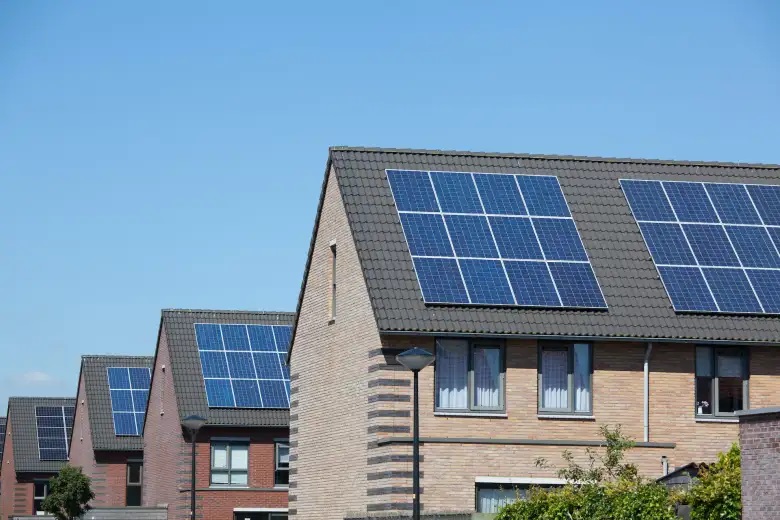There’s A Risk Rooftop Renewables Could Make The Rich Richer
Sep 4, 2023 | Pratirodh Bureau
Added renewable energy brings down the cost of energy, and by replacing fossil fuels, cuts planet-warming carbon dioxide emissions. But there is concern that as more people install solar panels and other renewable projects, local electricity grids may become congested
Many people are now becoming “energy citizens” by installing rooftop solar panels and other small-scale renewable energy projects in their properties.
In theory, this is a “win-win”. Added renewable energy brings down the cost of energy, and by replacing fossil fuels, cuts planet-warming carbon dioxide emissions. But there is concern that as more people install solar panels and other renewable projects, local electricity grids may become congested.
We wanted to understand this problem and propose a solution, and our latest research has just been published. Though we focused on Ireland, where we live and work, something similar is happening across much of the world.
We first surveyed the country’s entire electricity infrastructure and discovered that if everyone wanted rooftop solar, then the grid could only serve 5% of the 1.6 million electricity customers studied.
That’s based on each household wanting to install 6 kilowatts of renewables – rooftop solar on one side of a typical house, for instance, or a single small wind turbine – which is the maximum limit supported by the microgeneration support scheme in Ireland. In other words, if everyone installed solar panels, then 95% of households would not be able to connect them to the national grid.
This appears to mirror the situation at present in electricity grids like that of California, Spain and Germany, where early-comers are blocking access for latecomers. While these countries are further ahead in their rollout of rooftop solar, portions of the electricity grid now have no availability for new installations.
This is unfair: often, more well-off households are the first to install solar PV, and benefit from subsidies. It also limits how useful microgeneration can be to the overall goal of decarbonising society.
A Game Of Musical Chairs
The situation could be compared to a game of musical chairs.
The first problem is the number of chairs: the electricity grid was not designed for every house to produce lots of renewable energy. As the sun shines, for example, every customer with a solar panel must instantly use the electricity or spill it to the grid.
This is fine if only a few customers are spilling, but at a national scale all that spilled energy can exceed the physical capacity of the cables, causing equipment-damaging overvoltage or service interruptions from protection tripping. To prevent this, the grid operator must limit the amount of renewable energy connected.
There are some ways to address this problem technically – to make more chairs available. These include investing in new cables, or installing home battery banks and timed electric vehicle chargers so that energy use can be better coordinated. But these ideas all come with large financial costs.
Electricity grids in wealthy countries – the Irish grid being a good example – have been under construction for over a century and re-purposing them will be no small feat. Doing this may be even more difficult in emerging economies due to additional struggles to cover the costs.
The second problem is the music, or who gets to sit first. Current policy allows a “first-come first-served” approach to installing renewables, which inevitably gives priority to high-income portions of society to find an empty chair to sit in, and to benefit financially.
Justice Implications
As the electricity sector is transformed by renewable energy, there are new justice implications worth exploring. Imagine building a house, or moving to an area in the future, to find out that all grid availability has already been taken and it is not possible for you to connect any new solar panels. The direct benefits of owning a clean energy installation are not for you.
Our research suggests that it is possible to adjust this policy to make grid availability a shared resource. First, instead of blanket limits – like the subsidised 6 kilowatts in Ireland – we’ll need a detailed analysis of the grid to work out how much renewable generation per household is fair, or the maximum each can have without affecting others.
This calculation is necessary because that “fair share” varies for customers, as there are technical constraints derived from the user’s location in the grid (how near are they to a substation, how many people does that substation serve, how is it then connected to the wider grid, and so on).
The second way to better share the grid is to acknowledge that some households have the money to install more than their fair share, and instead help everyone else to work together. For instance, less interested or capable households could pool their shares in new solar panels or wind turbines in exchange for cheaper electricity derived from those very installations.
Factor In Equity
We should recognise some progress. Irish and European institutions are trying to achieve decarbonisation goals, and renewable energy installations are indeed accelerating. The transition to low-carbon energy is now inevitable – the question is not if, but how, the transition is conducted.
But renewable energy shouldn’t exacerbate existing inequalities. Policies for domestic wind and solar should factor in concerns about equity, meaning we could allow all electricity customers to benefit financially from clean energy, and not just from having cleaner air to breathe.
Our new research opens a discussion for regulators and government institutions. This is not about music or chairs, but about the fundamental question of fairness and ownership in a fast-evolving energy sector in Ireland and beyond.
(This article is republished from The Conversation under a Creative Commons license. Read the original article)
